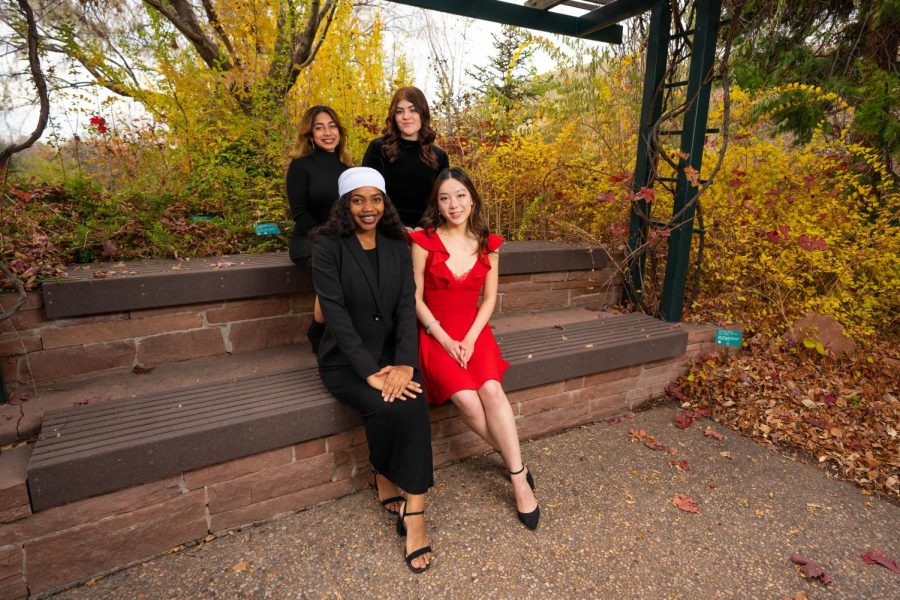Wojciechowski Presidency on Making Their Platform a Reality
(Photo by Gwen Christopherson | The Daily Utah Chronicle)
March 2, 2022
Accessibility, affordability, safety and solidarity for all are the principles the Wojciechowski cabinet ran on. The University of Utah student body put their support behind these ideals, and in spring of 2021 elected the Wojciechowski ticket as their next ASUU presidency.
Leadership for ASUU are responsible for bridging the gap between the student body and administration, advocating for their constituents and managing operations of the executive branch.
Within the 2021-22 presidency, Jess Wojciechowski serves as the president, Maryan Shale as the vice president of student relations, Tiffany Chan as the vice president of university relations and Sanila Math as the chief of staff.
Alongside the main components of their campaign, they also advocated for and created action items. In regard to accessibility, they committed to creating an “ASUU Director of Accessibility to oversee accessibility initiatives at the U” and advocating “for the University to modify their contract with Zoom to include automatic closed captioning.”
Their affordability initiatives include not raising student fees and providing better access to services such as childcare for students, faculty and beyond. Additionally, they committed to working with the Director of Finance so students could get a truly transparent look at their required fees.
“We wanted to look over the inclusivity and diversity piece of financial assistance [because] we want to make sure that there are no populations being excluded, specifically by certain initiatives or programs going on in the University,” Chan said. “We want to make sure that people are getting financial assistance. We want to make sure that people are safe from COVID.”
Safety, another pressing issue for the administration, took several forms and evaluated students’ well-being in regard to intimate partner violence and sexual assault, COVID-19 and the campus environment. Specifically, they aimed to support the Lauren McCluskey Foundation and students who are victims of interpersonal violence on campus.
Finally, solidarity for all focuses on amplifying the voices of marginalized students and orchestrating change initiatives on the U’s campus. For BIPOC and LGBTQIA+ students, the Wojciechowski administration aimed to listen to associated organizations and implement the changes they suggested.
“I want to make sure that a lot of the platform pieces that our ticket ran on are becoming initiatives that are being implemented,” Wojciechowski said. “Feminine hygiene products, working with different campus partners like childcare and the FeedU pantry and seeing where we can help financially with that.”
With a budget of $1,807,075 in 2019-2020, ASUU utilized student fees to implement the changes they deemed necessary. The 2021-22 budget will likely be similar and it was up to the leadership, in conjunction with the Finance Board, to determine appropriate allocation of these funds to foster growth for the University.
“Our budget philosophy is to use our money wisely and use as much of it, because this is all student fees and it wouldn’t make sense that we use one tenth of our budget for one thing,” Chan said. “So we want to be able to use as much of our money this year, especially when it’s such a critical time.”
Henry Decker, a first-year student at the U was unaware of ASUU’s budget.
“I don’t know what the budget is for ASUU, and I think the U has pretty good representation on most things already,” Decker said.
Coming back from a unique year in the pandemic, the presidency’s approach to their term was modified to fit safety standards while accounting for the unprecedented circumstances of COVID-19.
“We want to be very proactive in being safe during the pandemic,” Math said. “Even if we like to have all in-person events, we want to make sure that we’re being safe with COVID and that we’re encouraging masks and vaccinations and ensuring that we are being as safe as we can.”
The evolving situation of COVID-19, the needs of the university and student body and the current campus climate changed the funding and initiative plans of the administration.
“We are in a very hybrid age right now on our campus,” Shale said. “We want to make sure that students are accessing the same resources, the same news, information and updates, on and off campus.”










